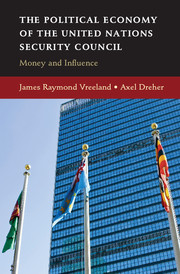Book contents
- Frontmatter
- Contents
- Figures
- Tables
- Acknowledgments
- 1 Money and Politics on the International Stage
- 2 A Theory of Trading Security Council Votes for Aid
- 3 Examples of Punishments, Threats, and Rewards
- 4 Who Wins Election to Represent the World?
- 5 Statistical Evidence of Trading Finance for Favors
- 6 Consequences of Politically Motivated Aid
- 7 Reforming the UNSC
- References
- Author Index
- Subject Index
3 - Examples of Punishments, Threats, and Rewards
Published online by Cambridge University Press: 05 June 2014
- Frontmatter
- Contents
- Figures
- Tables
- Acknowledgments
- 1 Money and Politics on the International Stage
- 2 A Theory of Trading Security Council Votes for Aid
- 3 Examples of Punishments, Threats, and Rewards
- 4 Who Wins Election to Represent the World?
- 5 Statistical Evidence of Trading Finance for Favors
- 6 Consequences of Politically Motivated Aid
- 7 Reforming the UNSC
- References
- Author Index
- Subject Index
Summary
Types of Examples
Exchanging money for political influence seems plausible at every political level – from local politics to international politics. Evidence of these arrangements, however, may elude the public, precisely due to their nature. Mixing finance and politics appears distasteful to many people, and political actors attempt to avoid scrutiny. More importantly, the mechanism may simply defy observation. Political favoritism may come from the highest levels of bureaucratic hierarchies, but the actual agreements may take place at lower levels and specialized bureaus – through thousands of small meetings. The politics of favoritism for UNSC members hardly ever takes place at the United Nations, but rather in the bureaucracies in state capitals all over the world. Rarely do officials actually offer quid pro quo deals; instead, important countries simply find their way to the tops of more agendas in meetings. Can we, therefore, present any evidence that governments trade money for political influence over the UN Security Council?
This chapter presents several examples – examples of governments that have made trades, and, interestingly, some examples of governments that have chosen not to enter into such deals. Recall that the theory presented in Chapter 2 indicates three main types of cases: (1) countries so closely aligned with donors that their political support comes for free, (2) countries too opposed to donors – or too expensive – to buy, and (3) swing voters – arguably the most interesting targets of trades because they offer their political support in certain situations only if enticed. The main donor that we have in mind in this chapter is the United States – although we find in Chapter 5 that the argument may apply to other donors, notably Japan and Germany, and perhaps key allies of the “West” – the United Kingdom and France. The theory implies that donors and recipients alike should seek to hide these trades. Many cases may thus defy corroboration. Still, we can present a series of archetypical examples that uphold the plausibility of our theory.
- Type
- Chapter
- Information
- The Political Economy of the United Nations Security CouncilMoney and Influence, pp. 62 - 93Publisher: Cambridge University PressPrint publication year: 2014



